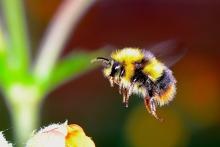Surprisingly, in any single location, there are typically more earthworms and more earthworm species found in temperate regions than in the tropics, according to a new study in Science. Global climate change could lead to significant shifts in earthworm communities worldwide, threatening the many vital functions they provide. Joann Whalen (NRS) is one of the co-authors on the study. McGill Reporter.


Canadian research is part of an extensive global climate change study that has found billions of the world’s poorest people are at risk.
The results, published Thursday in the journal Science, raise troubling questions about who will be able to adapt in a shifting, less dependable world.
“There’s a great potential for the problems to occur where people have the least ability to cope with it,” said Elena Bennett [NRS], who studies ecological systems at McGill University and is one of the paper’s 21 co-authors.

Nature supports people in critical ways, often at a highly local level. A wild bee buzzes through a farm, pollinating vegetables as it goes. Nearby, wetlands remove chemicals from the farm’s runoff, protecting a community drinking water source. In communities all around the world, nature’s contributions are constantly flowing to people.

Lorsqu’une contamination bactérienne se déclare à proximité d’une ferme, il faut cibler le plus rapidement possible les élevages problématiques puisque certaines souches peuvent parfois infecter l’homme. L’objectif est de mettre en place des barrières naturelles qui empêcheront les ruissellements provenant de ces fermes de se retrouver dans l’eau potable environnante.
OpEd by Emeritus Professor David Bird:
David M. Bird is an emeritus professor of wildlife biology at McGill University who has studied birds for five decades.
When I read the recent headlines that North America has lost nearly three billion birds over just the past five decades, I was not surprised. But I must admit it did depress me to a degree. That’s a lot of birds!
Opinion: Instead of flight shaming, let’s be thoughtful and selective about all travel
A conversation [between Raman Navankutty and Lior Silberman, both professors at the University of British Columbia; and Elena Bennett, a professor at McGill University] about flying leads to some unexpected discoveries about how to minimize the climate impacts of getting around.

McGill entomology researcher and PhD candidate Gail MacInnis presented her findings at the Apimondia International Apicultural Congress in Montreal earlier this week
McGill entomology researcher and PhD candidate Gail MacInnis says that when comparing pollination efficiency between wild bees native to Canada and the more numerous honey bees, there is no contest. Wild bees win, wings down.

The Natural Sciences and Engineering Research Council of Canada (NSERC) ensures Canada’s working landscapes remain biologically diverse, resilient, and adaptive

Two McGill researchers developing solutions to clean marine oil spills in the Northwest Passage and in oceans surrounding Canada to receive $3.7 million in funding from the Multi-Partner Research Initiative (MPRI).

Rappelling down a 650-foot cliff to catch seabirds on a remote island just below the Arctic Circle was scary enough.
“The first time you look over and you rappel over, it’s certainly not for the faint of heart,” said Kyle Elliott, a research chair in Arctic ecology at McGill University in Canada.
But for Elliott and fellow researcher Emile Brisson Curadeau, it was the hungry polar bears (Ursus maritimus) — usually one a day walking near their cabin — that raised real concerns, and devoured their research subjects.

Congratulations to NRS professor Joann Whalen who has been made a Fellow of the Canadian Society of Soil Science (CSSS). The Award is for members with a distinguished record of accomplishment in soil science & service to the CSSS.
CITATION

Congratulations to NRS professor Joann Whalen, who was recently awarded the Auguste Scott prize given by the Association quebecoise de specialistes en science du sol (AQSSS). Other professors who won it previously were Dr. Gus Mackenzie and Dr. Guy Mehuys. The prize is awarded for outstanding contributions to the field of soil science.

On June 14 in Victoria, British Columbia, the Honourable Kirsty Duncan, Minister of Science and Sport, announced an investment of over $275 million for 346 new and renewed Canada Research Chairs at 52 institutions across Canada. The Canada Foundation for Innovation also made an important investment towards these Chairs in providing more than $5.2 million in new funding for research infrastructure, supporting 30 Chairs at 18 institutions.

Some entomologists are sounding the alarm that native bees could be in danger of being wiped out, because of the popularity of urban beekeeping.
“The danger is that we’re probably losing species and don’t even know it,” says Gail MacInnis, a PhD entomology candidate at McGill University. Something needs to be done, she says, to control the number of honeybees being raised.
D’après Sébastien Faucher, professeur au département des sciences des ressources naturelles à l’Université McGill, les rince-bouche ne sont qu’une goutte d’eau dans la pollution de nos cours d’eau.
Lire dans Le Journal de Montréal
